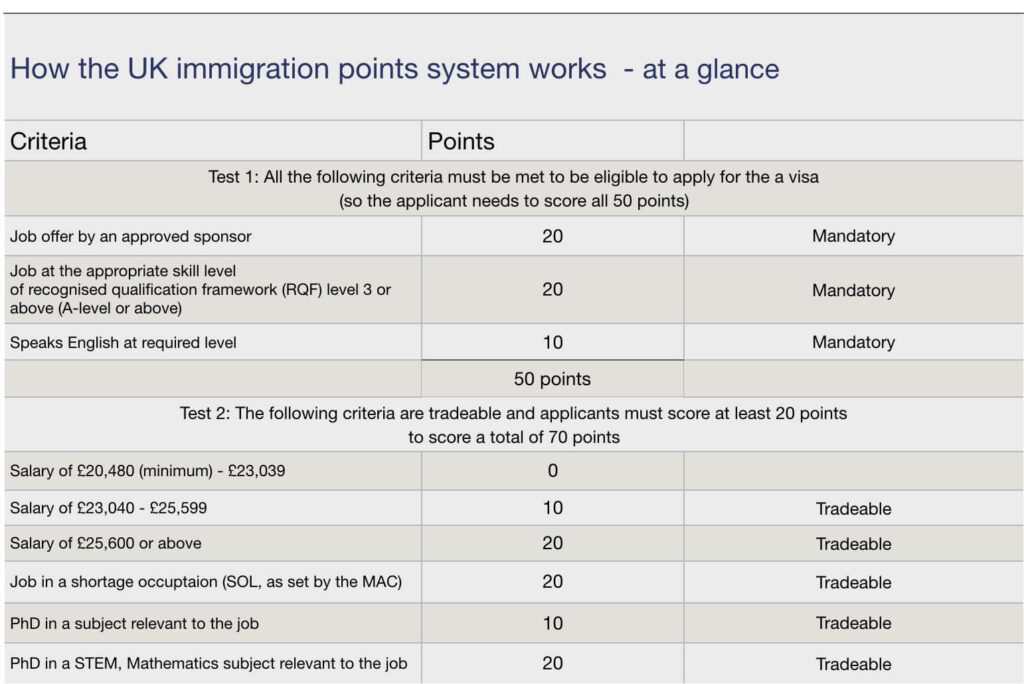The Brexit transition period ended on 31st December 2020, meaning the end of free movement of people between the EU and the UK, and the introduction on 1st Jan 2021 of a new points-based UK immigration system for the UK.
We have summarised the main changes and key points that employers and HRs need to know, below. As the Government has said, the system will develop, so keep an eye on the pages highlighting the latest developments as they are announced here: New Immigration System, what you need to know.
The new immigration system applies equally to EU and Non EU citizens. It ends the easy availability of low, and medium and high wage, labour from EU (excluding Ireland), and it lowers the bar to entry for Non EU citizens. It does allow UK business, especially large organisations and those who currently recruit beyond the UK for roles at graduate and A level, a big opportunity to look globally for their people and to attract younger talent earlier in careers, in a broader range of roles
Main changes to the UK immigration system
The end of free movement between the UK and the EU has given the Government an opportunity to overhaul the immigration system. It represents a major change for many employers who will now need a sponsor licence to hire most eligible employees from outside of the UK. The UK points based immigration system an introduction for employers, article on .gov.uk covers the changes in detail. In summary:
There is no longer a general route for employers to recruit for temporary work or work paid at or below the minimum wage.
- The old Tier 2 (general) visa category now becomes the new Skilled Worker Visa, with a few tweaks
- The skill and salary thresholds have been lowered, meaning organisations can look overseas for many more types of roles than previously, and have more scope to bring on people in lower skilled roles than before
- The Government has introduced tradeable points, applicants will be able to trade characteristics, such as qualifications, against a lower salary to get the required number of 70 points to be eligible
- and removed the resident labour market test, speeding up the process of hiring from overseas
- Employers will need to have a sponsor licence to hire most workers from outside the UK. This does not apply when hiring Irish citizens or EU citizens eligible for status under the European Settlement Scheme, of which more below
- The cost of hiring workers from the EU becomes significant: £9,500 for the visa alone for a 5 year Skilled Worker visa. This represents a weighty investment for smaller organisations looking to hire a limited number of roles at a mid salary level.
- There will be no cap on the numbers of people who can come to the UK on the Skilled Worker route.
0300 1234699 Monday – Thursday 10am – 3pm
Check that all the EU, EEA and Swiss nationals on your teams know about the deadline, know how apply to the European Settlement Scheme.
The new Skilled Worker Visa
From 1st January 2021, under the Skilled Worker route, anyone you want to hire from outside the UK will need to demonstrate that :
- they have a job offer from a Home Office licenced sponsor (their prospective employer)
- the job offer is at the required skill level (Recognised Qualification Framework RQF level 3 or above (A Level and equivalent)
- they speak English to the required standard.
In addition to this, the job offer must meet the applicable minimum salary threshold. This is the highter of either:
- the general salary threshold of £25,600 (lowered from £30,000 under the old Tier 2 (General) Visa)
- the specific salary requirement for their occupation, known as the ‘going rate’. Check gov.uk for further details on the the going rate for specific occupations.
There are some exceptions. The salary threshold is lowered further to £20,480 for migrants with:
- a job offer in a specific shortage occupation (as listed on the Government’s Shortage Occupation Lists (SOLs).
- a PhD relevant to the role they are looking to take up
- a PhD in a STEM subject relevant to the role they are looking to take up
The lower salary of £20,480 p.a equates to a minimum hourly rate, in force from April 6 2021, of £10.10 for non UK national on a Skilled Worker Visa, based on a 39 hour working week.
There are different salary rules for workers in certain health or education jobs, and for ‘new entrants’ at the start of their careers.
The Shortage Occupation List (SOL)
The salary threshold of £25,600 p.a is lowered for ‘shortage occupations’:
listed in the Government’s UK wide general Shortage Occupations List (SOL), such as engineers, software developers and similar, and
those listed in the Shortage Occupations List for Healthcare and Education, including care home and healthcare workers & managers, nurses & nursing assistants, medics and secondary school language and science (Physics) teachers.
This means that a nurse on £22,000 a year could still enter the UK as a ‘shortage occupation’.
The Government will carry out frequent reviews of the SOLs. Eight occupations in the health and care sector as well as modern language teachers have been added to the SOL following MAC recommendations published in September 2020. Sector trade groups and federations, such as the construction and hospitality trade bodies, lobby to have roles included in the SOL. Expect lots of activity from farmers, hospitality and food and drink lobby groups going forward, and keep an eye on the SOL pages linked here.
Identifying whether a job meets the required skill level
All jobs have a corresponding Standard Occupational Classification (SOC) code. Each SOC code has a designated skill level. This determines whether the job meets the requirements of the Skilled Worker route.
As we have highlighted, the minimum skill level has been lowered under the new system, so that A-level grade jobs, such as plasterers, plumbers, carpenters, (but not waiters or waitresses) are now classed as Skilled by the Government’s Migration Advisory Committee (MAC). Chefs have been removed from the Shortage Occupations List (SOL) but continue to be eligible for the Skilled Worker Visa route due to the changes in what is classed by the MAC as Skilled roles, and the new lower salary thresholds.
The full list of occupation codes allowed under the Skilled Worker route can be found here in the further details section of the points-based immigration system guidance on gov.uk.
How the new UK points based immigration system works
The new regime is a points based system in part.
Applicants must fulfil the mandatory a job offer and language requirements (in Test 1) to score 50 points. They can then score at least 20 points (in Test 2) to reach the necessary 70 points required to be eligible for the Skilled Worker Visa. At Test 2 stage, applicants can trade characteristics, such as their qualifications, against a lower salary, to get the required number of points.

Gov.uk has full details on the points based system for the Skilled Worker Visa, with examples and case studies. There are also full details of the other types of visa available, worth checking, at the same link.
The Government is intending to introduce a a Highly Skilled Worker Visa, allowing workers rated as “global talent” such as scientists and academics, musicians and artists, to enter the UK without a job offer if they have the required points and are sponsored by a relevant professional body. Their numbers will be capped. The Government is consulting on this and it is not anticipated until at least 2022.
Short term business traveller visas: Frontier Worker Visa
A note about the Frontier Worker Visa. For businesses who have EU nationals frequently travelling to the UK for work (outside times of covid-19 restrictions), the Government is keen for organisations to use the new Frontier Worker Visa. This allows EU nationals to continue to travel regularly to work in the UK, and to do more work wise than they would be allowed under a visitor visa, providing some continuity in this period.
Details of all the visa types can be found here.
What are the costs involved in obtaining a sponsor licence
The costs involved of applying to the Home Office for a licence to become an approved sponsor are outlined here. The costs vary depending on the size of the organisation, but for SME’s the licence fee is currently £536. The Government says that most applications can be dealt with in less than 2 months, you may be able to get a faster decision for an additional fee of £500.
Remember that this is just the fee for the licence. There will also be costs for issuing certificates to each individual migrant under the licence, and additional application costs such as, immigration skills charges, immigration health surcharge, before the costs of the visa application itself.
European Settlement Scheme
The European Settlement Scheme allows EU, EEA and Swiss nationals and their families to continue to live, work and study in the UK beyond June 30th 2021. Given the concerns about the supply of EU nationals in the UK post-brexit, in the context of this article, it perhaps worth ending on this note. According to provisional figures, at the end of January 2021, the Home Office had received 5 million applications to the European Settlement Scheme since the scheme opened. More than 2.4 million of those have been granted settled status, allowing them permanent leave to remain. A further 2 million have been granted pre-settled status.
The new immigration rules represents a big learning curve for organisations that have, so far, not needed to recruit EU nationals formally in this way. It is important to refer to the Government pages highlighted in this article, because they change regularly. Good planning is vital, make sure you know the main immigration rules as they relate to your business, the risks if your business relies on temporary, ad hoc EU workers, and the opportunities the new scheme presents. Do get in touch if you need help.





